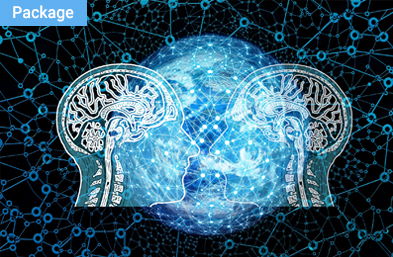Cancer is known to be the second leading cause of death globally. According to the World Health Organization (WHO), there were around 9.6 million deaths worldwide in the year 2018 due to it. And the number of deaths from cancer is staggering day-by-day. So, we need a powerful weapon to fight cancer. And in today’s digital era, the best weapon to fight cancer is Artificial intelligence or AI.
In modern times, the utilization of cutting-edge ‘AI as a service’ solutions has tremendously increased in the healthcare industry, especially in the field of oncology. So, AI is known to be oncology’s powerful new weapon.
This blog post will help you to know the pitfalls in oncology, how AI can address those challenges and what are the applications of AI in clinical oncology research.
The current challenges in oncology
- Analyze the large amount of data generated in oncology, including genomic data, transcriptome data and a lot of different morphologic data types.
- Lack of an effective early diagnosis of cancer. For example, rare cancers like mesothelioma are often misdiagnosed by oncologists at first.
- Difficult to tailor cancer treatment plans for each patient differently, i.e. precision medicine.
- Other challenges include genomic analysis, clinical trial design, drug development and precise classification of diseases.
Such inherent complexities and challenges of human malignancies in oncology calls for the adoption of smart technologies like AI and Machine Learning (ML).

Discover what, why and how of Vision AI at the Edge
Webinar agenda
- What is Vision AI at the Edge
- Why vision AI at the edge is a game-changer
- Applications of Vision AI at the Edge
- Industrial use cases for accelerating AI at the Edge
- Q & A
AI – a new weapon in the war against cancer
Recent advances in biological and computer sciences are driving health professionals and scientists to use advanced technologies in the study of cancer. AI, in particular, has revolutionized the way oncologists, pathologists and radiologists deal with cancers.
But the question is: how can AI help oncologists fight one of the most complex and deadly battles against cancer? It is quite simple: AI could train/re-train a model to look at hundreds of thousands of cancerous and non-cancerous cells. Now, this enables machines to learn about a specific disease more accurately and rapidly.
There are several smart technologies that fall under the umbrella of AI. Let’s see how different AI technologies can help oncologists and scientists in fighting cancer.
- Cloud computing – Prepare, store and share datasets in real-time to discover significant co-occurrence patterns for different regimens, tests, diagnoses, treatments, etc.
- AR/VR – Train students, plan upcoming surgeries, explain procedures to patients, guide surgeons during operations, etc.
- Bots – Send reminders to patients to take medicines, undergo diagnostic tests, collect patient histories or read the relevant information on patient’s cancers.
Today, many researchers are also using different AI technologies to combat cancer in different ways. For instance, Microsoft is pouring tons of research into research groups trying to utilize AI and ML algorithms in oncology. In fact, in the year 2018, Microsoft’s team of researchers started using AI models to help oncologists figure out the most effective, individualized ways to treat cancer patients.

AI strategy and planning workshop
Artificial intelligence is transformational, and adopting this technology will enable companies to reshape their strategic vision so that they no longer rely on what they think is true, rather, leverage factual-based decision-making capabilities.
AI applications in oncology
In the machine age, researchers have started scratching the surface of all the ways to use AI in oncology. And with each passing day, they are coming up with new applications of AI in cancer research and care.
Clinical decision-making
Decision-making is the goal of leveraging data science in clinical cancer research and care. Hence, to discover the best treatments for patients, clinicians must make data-driven decisions. However, analyzing a large amount of clinical data collected from different sources like biological data, electronic medical records (EMR), molecular/non-molecular imaging, etc. brings new opportunities.
The ability to extract rich insights from vast depots of clinical data and predict outcomes using data science and ML models provide huge potentials to clinicians. Now, let us look at some crucial clinical decision scenarios where AI can become useful.
- Disease detection
- Lesion segmentation
- Treatment selection
- Response assessment
- Clinical prediction
Cancer imaging and diagnosis
Nowadays, AI-powered tools and techniques are widely utilized to turn medical images into biomarkers and make cancer diagnostic tests much more efficient. AI can streamline different types of imaging processes within oncology like Positron Emission Tomography (PET), radiation risk, clinical photographs, digital mammography, etc.
Deep learning + Machine learning = Precise cancer imagining + Rapid cancer diagnosis
For instance, now radiologists utilize AI and train ML algorithms to identify different patterns of myeloma infiltration in full-body MRI images. In fact, the scientists of the US-based National Cancer Institute (NCI) under its intramural research program are already leveraging AI for the automated detection of precancerous lesions using cervical images.
Cancer prognosis
The future of cancer prognosis is AI-enabled and data-driven. AI can assist radiologists and pathologists in early cancer prognosis. Machine learning and Deep learning algorithms also help them to predict three significant aspects of cancers – susceptibility, recurrence, and survival.
Predictive analytics can prove to be useful in clinical cancer prognosis/prediction in the following ways:
- Clinical oncology: Predict outcomes of the drugs; estimate the risks of using it and future cancer methodologies.
- Pathology: Get rich insights on biopsy reads; predict the optimal treatment for a cancer patient and perform accurate prognoses.
- Radiomics: Predict the aggressiveness of disease and the response of particular cancer treatment or surgery.
Precision medicine
To fight cancer, all that a patient requires is the right drug at the right time i.e. precision medicine. The key objective of precision oncology is to translate patient data to individualized therapies as quickly as possible. And AI opens a new door for genomic sequencing that can help oncologists to process genetic mutations for precision medicine more precisely. The most used ML models in precision medicine include:
- Deep learning
- Logistic regression
- Linear regression
- Decision tree
Hence, we can say that the next-generation AI, ML and NLP (Natural Language Processing) algorithms are underpinning a whole new revolution in precision medicine, making breakthroughs to usher in a new era of healthcare intelligence.
Drug discovery and development
The process of developing drugs, in particular, cancer drugs, costs millions of dollars and extends up to ten or fifteen years. So, biotech and healthcare companies have started turning towards the adoption of AI for rapid and smarter clinical trials. AI-enabled clinical trials empower the pharmaceutical industry to discover novel cancer drugs and bring them to the market faster.
Combining AI, ML and genomic data, clinicians can not only discover drugs faster but also repurpose and develop effective cancer drugs in a matter of days. Let us see some uses of machine learning and data science in biomarker discovery.
- Automate the drug discovery process
- Repurpose existing drugs for new indications
- Predict how compounds work inside a specific cancer
- Lower the timeline and risk of oncology drug development
Personalized cancer treatment
Until now, the standard of care to fight cancer was to follow the same ‘cut-burned poison’ approach for every individual. But the type of cancer of every patient will not be the same, so every individual cannot be treated the same. This means, every individual requires personalized cancer care and treatment, and AI makes it a lot easier.
For instance, AI is changing the way lung cancer patients receive radiation therapy today. It combines ML and EHR data to generate a data-driven, personalized dose of radiation for each patient during the cancer treatment. So, we can say that artificial intelligence in cancer treatment can assist doctors in tailoring treatment plans separately for each cancer patient.
The next step
In modern times, the amount of clinical data being generated is astounding, including the patient’s entire genomes. Thus, oncologists, pathologists and radiologists around the world are turning towards the adoption of AI to make sense of all clinical data and help them streamline cancer research.
If you are into the field of oncology and seeking a way to make your cancer research processes more intelligent, then you can get in touch with our AI experts.




